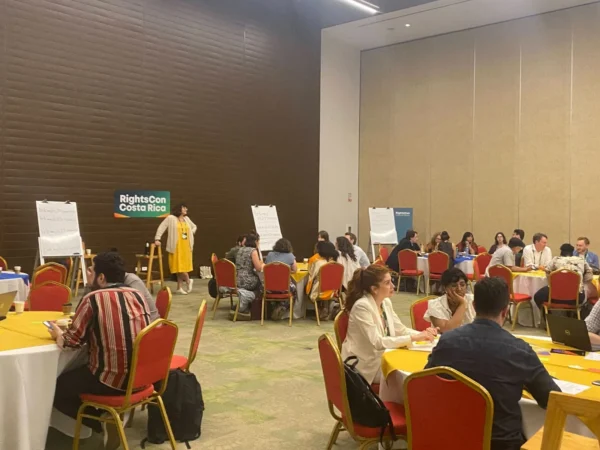By Idan Ben Yakir
With members spread across continents, collaboration across borders and time zones is pivotal to the work we do at GNI, and the opportunities for a large number of GNI members to share the same physical space are few and far between. Access Now has provided RightsCon as a forum for digital activists, company representatives, government officials, and independently interested parties to meet and discuss continuing and emerging complex digital rights issues since 2011. After three virtual replacements brought on by — well, you know — two of which I attended from my living room, I was delighted to be able to take part in this in-person return to form.
The technologies that allow us to communicate instantaneously are marvelous for enabling the mechanics of international rights work, and in fact enabled the expansion of the conference to a hybrid format that allowed sessions to be attended across the world. But the four days I spent at RightsCon were invaluable because of the organic human interactions that digital participation rarely leaves space for.
Read: GNI at 2023 RightsCon: Protecting Rights in the Digital Age
On day three of the conference I co-led the workshop Peeking Behind the Curtain: How GNI Companies Respond to Government Demands, which was designed to help participants understand the legal and practical obstacles that companies face when trying to protect human rights against government demands. Participants in this exercise played the role of GNI telecommunications member company executives while we, as facilitators, acted as a fictional repressive government making rights-violating demands. Using the GNI Principles and Implementation Guidelines, participants deliberated over the most rights-respecting decisions, with each decision leading to consequences for the company and the citizenry, which were carried over into the next scenario. (Instructions and materials for this workshop here.)
I listened to our participants collaborate on solutions to digital repression in the fictional Republic of Genovia, and I watched as comprehension of the situation’s subtleties rippled through the room.
One of our participants, a man who lived through an Internet shutdown in his home country, shared how a simple notice from the company stating that the shutdown was government mandated was pivotal in reducing confusion about what was happening and therefore unifying and mobilizing the citizenry’s response.

Source: GNI
For those of us who are accustomed to discussing human rights violations that usually do not personally affect us, it can sometimes feel like the measures we consider from the comfort of our offices are marginal at best or empty at worst, and it can be difficult to convey their impact. But through interactions like this one, RightsCon demonstrated exactly how meeting and conversing with activists who navigate such violations firsthand is irreplaceable — especially in a world where the digital access we have might give us the illusion of firsthand knowledge.
At other times that week I learned how North Korean citizens circumvent media restrictions by distributing flash drives with South Korean television shows, and how they share news not just outside the country, but also from one region to another within its borders, in breach of nationalistic propaganda laws but in service of access to information. I heard about how, with technology that evolves at a faster pace than democratic legal frameworks can, laws intended to protect groups like children can have devastating consequences for the lives and livelihoods of other groups, like sex workers, and what adjustments could be made in order to find a middle ground that considers the safety of both.
The notion of “digital rights”, which is to say applying human rights in the virtual world, might easily be written off as laughable to anyone born before 1970 or living in a low-connectivity environment, but it is impossible to attend RightsCon, whether virtually or in person, without seeing that the consideration is a necessary one. Even as we gathered to discuss the best ways to maintain a free and open Internet, a significant portion of scheduled speakers and participants were prevented from traveling due to arbitrary visa troubles, and although some were able to participate virtually, their physical absence was felt. We tend to think of the Internet as an equalizing space, but the truth is that it is a reflection of the deeply unequal state of the world. Although the means may seem pixelated and distant, human rights concerns like ethnic discrimination or the violation of the freedom of assembly online directly reflect the realities of the physical world.
As we continue to digitize so much of our lives in new ways, we must do so knowing that without input from the stakeholders who both use the internet and make it function, without intentional attention to the specific needs of particular communities, the best we may expect is that it will continue to maintain that status quo.
To that end, GNI’s year-round work advocating for rights-respecting policy and regulation, sharing insights about the potential effects of new technologies, and holding companies accountable to their commitments to human rights principles regardless of the legal framework they operate in by convening companies, human rights organizations, investors, and academics worldwide is in indispensable.